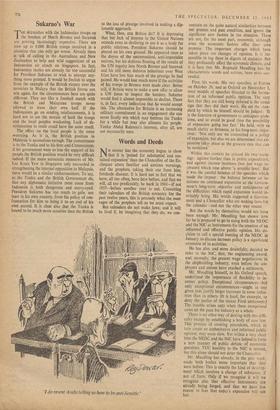Sukarno's War
MHE skirmishes with the Indonesian troops on I the borders of North Borneo and Sarawak are proving increasingly expensive. There are now up to 6,000 British troops involved in a situation that can only get worse. Already there is talk of calling in the Australians and New Zealanders to help and wild suggestion's of an Indonesian air attack on Singapore. In fact, Indonesian tactics are already far too successful for President Sukarno to wish to attempt any- thing more pointed. It would be foolish to argue from the example of the British victory over the terrorists in Malaya that the British forces can win again, for the circumstances here are quite different. They are like a football match with the British and Malaysian troops never allowed to leave their own half. If the Indonesians go on sending reinforcements, it is hard not to see the morale of both the 'troops and, the local peoples weakening. Lack of de- termination to resist could have the same result.
The effect on The local people is the more worrying. As it is, the British position in Malaysia is anomalous enough. The commitment is to the Tunku and to his firm anti-Communism; if his government were to lose the support of his people the British position would be very difficult indeed. If the more autocratic measures of Mr. Lee Kuan Yew in Singapore only succeeded in strengthening the internal opposition to Malaysia, there would be a similar embarrassment. To say, as the Tunku and the British Government do, that ,any diplomatic initiative must come from Indonesia is both dangerous and starry-eyed. President Sukarno has too much to gain, not least in his own country, from his policy of con- frontation for him to bring it to an end of his own accord. It is clear also that the Tunku is bound• to be much more sensitive than the British
to the loss of piestige involved in making a dip- lomatic approach.
What, then, can Britain do? It is depressing that her lack of interest in the United Nations extends even to declining to use it as a body for public relations. President Sukarno should be played on his own ground. He appeared once as the doyen of the uncommitted, anti-imperialist nations, but his dubious flouting of the results of the UN inquiry into North Borneo and Sarawak and his still more dubious behaviour over West Irian have •lost him much of the prestige he had gained. He would lose much more if the activities of his troops in Borneo were made clear. Better still, if Britain were to make a new offer to allow a UN force to inspect the borders,• Sukarno would find it almost impossible to decline. There is, in fact, every indication that he would accept this. The alternative for Britain is an increasing military commitment in an engagement she can never finally win which may buttress the Tunku for a while but may also alienate his people. Tunku Abdul Rahman's interests, after all, are not necessarily ours.






































 Previous page
Previous page